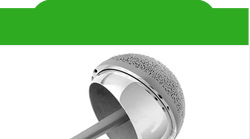Pre-op FAQ
Q. Is there a better time of year to have the surgery?
A. This is a personal decision; some patients like to have the surgery in good weather so that they may walk outdoors as part of their recovery; others prefer to do the surgery in the winter so that they may recover in time to participate in springtime activities.
Q. I read that Dr. Su uses several different implants for hip resurfacing. Which will I get?
A. Dr. Su uses implants from Smith and Nephew, Wright Medical, and Biomet. For most cases, he is using the Birmingham Hip Resurfacing from Smith and Nephew, as it is the implant with the longest track record. If a patient has a preference for one of these devices, it can be accomodated.
Q. Should I donate a pint of blood prior to surgery?
A. Most patients who are healthy and have no history of heart trouble will not require a blood transfusion. However, if you want to make sure that you don't need blood from anyone else, you can pre-donate a pint of your own blood prior to surgery.
Q. Should I be tested for an allergy to the metal?
A. This is a good question. Currently, there are no proven tests that correlate with the development of an allergy to the implant. However, if you have a history of a reaction to dental fillings, implants, or cement, please do mention this to the doctor at the time of your consult.
Q. Is this surgery "Minimally Invasive"?
A. The surgery is minimally invasive to your bone, as compared to a total hip replacement. However, the incision is longer that for a total hip due to the need to preserve the femoral head. There are no major muscles cut; the muscles are pushed aside for the surgery. The only muscles that are cut, are the short external rotators, which are very small tendons at the back of the hip joint. They are about the size of your pinky finger, and are reattached to the bone at the conclusion of the operation. So, the surgery is also minimally invasive in the handling of your muscles.
Q. How long is the incision?
A. The incision length will vary depending upon how much tissue you have between your skin and the hip joint, how muscular you are, and how stiff your hip is. Generally, the incision is between 5-8 inches in length.
Q. When should I stop taking my medications?
A. You can continue taking most medications up until the day of surgery, with the exception of anti-inflammatories like ibuprofen and naprosyn. You should discontinue any blood thinners about 1 week prior to surgery. This will be reviewed with you during your preoperative consultation with the medical doctor, as well as in your preoperative education class.
Q. Do I need the raised toilet seat, grasper, and high chair?
A. These items may help you stay comfortable in the first few weeks of your recovery, although they are not required. You can see how you feel after surgery, while in the hospital. They are available for purchase from the physical therapy department at HSS.
Q. In the preop class, they kept referring to total hip replacements, so a lot of it didn't apply to me. Why don't you have a class for resurfacing?
A. Dr. Su has tried previously to have the hospital have a separate class for hip resurfacing. But, after an analysis, the hospital did not find it to be cost-effective. Many patients have said that they have still felt the class to be informative and educational, however.
Q. Should I be doing any special exercises for the hip preop? Should I go to physical therapy?
A. No, there are no special things to do preoperatively; just try to keep walking and as flexible as possible. Cycling and yoga are good ways to achieve these goals. If you really want to try to speed up your recovery, you can strengthen the abductor muscles at the side of the hip by performing side-leg raises. Formal physical therapy is not necessary, and often it can be painful with an arthritic hip.
Q. Should I take any supplements to help strengthen my bones preop?
A. I recommend calcium and vitamin D supplements to keep the bones strong. 1000-1500 mg of calcium citrate and 400 IU of vitamin D should be adequate.
Q. Should I have a bone density test preoperatively?
A. Generally, for men, this is not necessary. For women, if your bone density is in question, Dr. Su may ask you to obtain a DEXA bone density scan.
Q. I read that women have had more problems with hip resurfacing-is this true?
A. This is an important topic that deserves special discussion. Please see this section on women and hip resurfacing.
The Center for Hip Pain & Preservation
541 East 71st Street
New York, NY 10021
 Click here for Driving Directions
Click here for Driving Directions

















